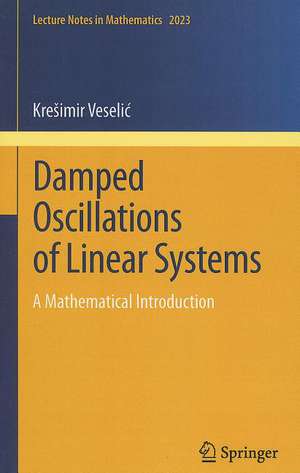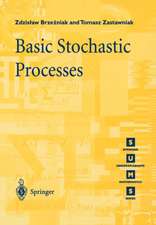Damped Oscillations of Linear Systems: A Mathematical Introduction: Lecture Notes in Mathematics, cartea 2023
Autor Krešimir Veselićen Limba Engleză Paperback – 9 iul 2011
This volume gives an introduction to linear finite dimensional damped systems as they are viewed by an applied mathematician. After a short overview of the physical principles leading to the linear system model, a largely self-contained mathematical theory for this model is presented. This includes the geometry of the underlying indefinite metric space, spectral theory of J-symmetric matrices and the associated quadratic eigenvalue problem. Particular attention is paid to the sensitivity issues which influence numerical computations. Finally, several recent research developments are included, e.g. Lyapunov stability and the perturbation of the time evolution.
Din seria Lecture Notes in Mathematics
- 17%
 Preț: 360.43 lei
Preț: 360.43 lei -
 Preț: 459.92 lei
Preț: 459.92 lei -
 Preț: 121.41 lei
Preț: 121.41 lei -
 Preț: 175.68 lei
Preț: 175.68 lei -
 Preț: 197.00 lei
Preț: 197.00 lei -
 Preț: 279.76 lei
Preț: 279.76 lei -
 Preț: 477.66 lei
Preț: 477.66 lei - 17%
 Preț: 361.89 lei
Preț: 361.89 lei -
 Preț: 252.37 lei
Preț: 252.37 lei -
 Preț: 353.99 lei
Preț: 353.99 lei -
 Preț: 138.88 lei
Preț: 138.88 lei -
 Preț: 152.61 lei
Preț: 152.61 lei -
 Preț: 116.67 lei
Preț: 116.67 lei -
 Preț: 102.77 lei
Preț: 102.77 lei - 17%
 Preț: 365.53 lei
Preț: 365.53 lei -
 Preț: 396.76 lei
Preț: 396.76 lei - 17%
 Preț: 362.15 lei
Preț: 362.15 lei -
 Preț: 396.13 lei
Preț: 396.13 lei -
 Preț: 357.80 lei
Preț: 357.80 lei - 17%
 Preț: 362.31 lei
Preț: 362.31 lei -
 Preț: 403.81 lei
Preț: 403.81 lei - 17%
 Preț: 361.73 lei
Preț: 361.73 lei -
 Preț: 499.87 lei
Preț: 499.87 lei -
 Preț: 457.03 lei
Preț: 457.03 lei -
 Preț: 395.91 lei
Preț: 395.91 lei -
 Preț: 459.00 lei
Preț: 459.00 lei -
 Preț: 487.57 lei
Preț: 487.57 lei -
 Preț: 424.01 lei
Preț: 424.01 lei -
 Preț: 487.57 lei
Preț: 487.57 lei -
 Preț: 330.55 lei
Preț: 330.55 lei -
 Preț: 325.75 lei
Preț: 325.75 lei -
 Preț: 350.30 lei
Preț: 350.30 lei -
 Preț: 331.31 lei
Preț: 331.31 lei -
 Preț: 408.37 lei
Preț: 408.37 lei -
 Preț: 328.25 lei
Preț: 328.25 lei -
 Preț: 421.28 lei
Preț: 421.28 lei -
 Preț: 276.08 lei
Preț: 276.08 lei -
 Preț: 424.60 lei
Preț: 424.60 lei -
 Preț: 422.05 lei
Preț: 422.05 lei -
 Preț: 505.01 lei
Preț: 505.01 lei -
 Preț: 422.05 lei
Preț: 422.05 lei -
 Preț: 274.93 lei
Preț: 274.93 lei -
 Preț: 335.16 lei
Preț: 335.16 lei -
 Preț: 422.27 lei
Preț: 422.27 lei -
 Preț: 497.49 lei
Preț: 497.49 lei -
 Preț: 272.81 lei
Preț: 272.81 lei -
 Preț: 428.04 lei
Preț: 428.04 lei -
 Preț: 376.22 lei
Preț: 376.22 lei -
 Preț: 427.10 lei
Preț: 427.10 lei -
 Preț: 325.92 lei
Preț: 325.92 lei
Preț: 352.37 lei
Nou
Puncte Express: 529
Preț estimativ în valută:
67.43€ • 72.10$ • 56.22£
67.43€ • 72.10$ • 56.22£
Carte tipărită la comandă
Livrare economică 18 aprilie-02 mai
Preluare comenzi: 021 569.72.76
Specificații
ISBN-13: 9783642213342
ISBN-10: 3642213340
Pagini: 228
Ilustrații: XV, 200 p. 8 illus.
Dimensiuni: 155 x 235 x 12 mm
Greutate: 0.36 kg
Ediția:2011
Editura: Springer Berlin, Heidelberg
Colecția Springer
Seria Lecture Notes in Mathematics
Locul publicării:Berlin, Heidelberg, Germany
ISBN-10: 3642213340
Pagini: 228
Ilustrații: XV, 200 p. 8 illus.
Dimensiuni: 155 x 235 x 12 mm
Greutate: 0.36 kg
Ediția:2011
Editura: Springer Berlin, Heidelberg
Colecția Springer
Seria Lecture Notes in Mathematics
Locul publicării:Berlin, Heidelberg, Germany
Public țintă
ResearchCuprins
1 The model.- 2 Simultaneous diagonalisation (Modal damping).- 3 Phase space.- 4 The singular mass case.- 5 "Indefinite metric".- 6 Matrices and indefinite scalar products.- 7 Oblique projections.- 8 J-orthogonal projections.- 9 Spectral properties and reduction of J-Hermitian matrices.- 10 Definite spectra.- 11 General Hermitian matrix pairs.- 12 Spectral decomposition of a general J-Hermitian matrix.- 13 The matrix exponential.- 14 The quadratic eigenvalue problem.- 15 Simple eigenvalue inclusions.- 16 Spectral shift.- 17 Resonances and resolvents.- 18 Well-posedness .- 19 Modal approximation.- 20 Modal approximation and overdampedness.- 21 Passive control.- 22 Perturbing matrix exponential.- 23 Notes and remarks.
Recenzii
From the reviews:
“The present book is a very detailed study of this damped system in 22cChapters and an addendum devoted to notes and remarks. The theoretical aspects are very interestingly combined with practical examples for several domains. … An important aspect is that each chapter contains a large number of exercises, some of them obligatory since they are used later. So, this material can be very useful for a course to students from different special areas.” (Mircea Crâşmăreanu, Zentralblatt MATH, Vol. 1232, 2012)
“This book is devoted to a mathematical study of damped oscillations described by linear systems of ordinary differential equations. The topic is of vital interest in optimization, control theory and, of course, in the stability of mechanical structures. … Examples and exercises are integral parts of the text and some of them introduce the reader to research questions.” (Piotr Biler, Mathematical Reviews, Issue 2012 h)
“The present book is a very detailed study of this damped system in 22cChapters and an addendum devoted to notes and remarks. The theoretical aspects are very interestingly combined with practical examples for several domains. … An important aspect is that each chapter contains a large number of exercises, some of them obligatory since they are used later. So, this material can be very useful for a course to students from different special areas.” (Mircea Crâşmăreanu, Zentralblatt MATH, Vol. 1232, 2012)
“This book is devoted to a mathematical study of damped oscillations described by linear systems of ordinary differential equations. The topic is of vital interest in optimization, control theory and, of course, in the stability of mechanical structures. … Examples and exercises are integral parts of the text and some of them introduce the reader to research questions.” (Piotr Biler, Mathematical Reviews, Issue 2012 h)
Textul de pe ultima copertă
The theory of linear damped oscillations was originally developed more than hundred years ago and is still of vital research interest to engineers, mathematicians and physicists alike. This theory plays a central role in explaining the stability of mechanical structures in civil engineering, but it also has applications in other fields such as electrical network systems and quantum mechanics.
This volume gives an introduction to linear finite dimensional damped systems as they are viewed by an applied mathematician. After a short overview of the physical principles leading to the linear system model, a largely self-contained mathematical theory for this model is presented. This includes the geometry of the underlying indefinite metric space, spectral theory of J-symmetric matrices and the associated quadratic eigenvalue problem. Particular attention is paid to the sensitivity issues which influence numerical computations. Finally, several recent research developments are included, e.g. Lyapunov stability and the perturbation of the time evolution.
This volume gives an introduction to linear finite dimensional damped systems as they are viewed by an applied mathematician. After a short overview of the physical principles leading to the linear system model, a largely self-contained mathematical theory for this model is presented. This includes the geometry of the underlying indefinite metric space, spectral theory of J-symmetric matrices and the associated quadratic eigenvalue problem. Particular attention is paid to the sensitivity issues which influence numerical computations. Finally, several recent research developments are included, e.g. Lyapunov stability and the perturbation of the time evolution.
Caracteristici
No recent texts on this topic Multidisciplinarity Self-containedness Includes supplementary material: sn.pub/extras
















